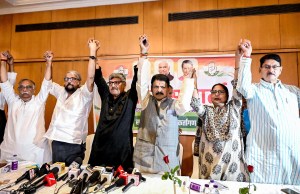Sharif’s dangerous game
It is the worst possible scenario for Pakistan to have a full-blown constitutional crisis in the midst of its severe economic troubles. Cen...

It is the worst possible scenario for Pakistan to have a full-blown constitutional crisis in the midst of its severe economic troubles. Censured by the Supreme Court for derogatory remarks against judges, Prime Minister Nawaz Sharif now faces the prospect of a sentence of disqualification from the Assembly for a minimum period of six months and a possible prison term. This is the climax of a long confrontation between the judiciary and the executive in the course of which the Prime Minister and the Chief Justice disputed plans to enlarge the Supreme Court bench and the provisions of an anti-defection law. Sharif’s latest move shows defiance of the court and is an abuse of his legislative powers. Hours after his first appearance in court to face charges of contempt, he pushed an amendment of the Contempt of Court Act through the National Assembly. The retrospective application of the amendment, if approved by President Farooq Leghari, would stay any censure ruling by the Supreme Court and give Sharif the right to appeal to a different bench. The blatant political expediency here is of a piece with Indira Gandhi’s desperate measures when faced with disqualification after the Allahabad court judgment on electoral malpractice.
The irony is that until Sharif embarked on his foolhardy course of taking on the court, he was in a politically invincible position. With his massive two-thirds majority in the National Assembly, he had been able to deal effectively with the nemesis of all Pakistani prime ministers by striking down, through a constitutional amendment, the President’s power to dismiss the Prime Minister. But those advantages have been thrown to the winds in nine short months. Call it hubris. Certainly Sharif has gone about his disagreements with the court with an arrogant disregard of the democratic principle of the separation of powers. All Pakistan’s prime ministers, going back to Zulfikar Ali Bhutto, were keen to have pliable judges. Pakistan can be thankful for the fact that many judges remained independent through thick and thin. The present tussle is a major crossroads in the struggle for an independent judiciary. It is not necessary that the victory of one institution should mean the impotence of another.
The one person who may be able to pull Pakistan back from the brink even at this late hour is President Leghari if he uses the powers of persuasion which his office bestows on him. The crisis is a test of his statesmanship. As the constitutional head of government, it is his primary duty to make the system work and at the present juncture that would mean compelling Prime Minister Nawaz Sharif and Chief Justice of the Supreme Court Sajjad Ali Shah to resolve the tangle of differences between them without upsetting the whole democratic applecart. What Pakistanis will be asking themselves is, will Leghari rise above the fray and act to strengthen the democratic system or take political advantage of the situation and weaken the fabric still further?



- 01
- 02
- 03
- 04
- 05




























